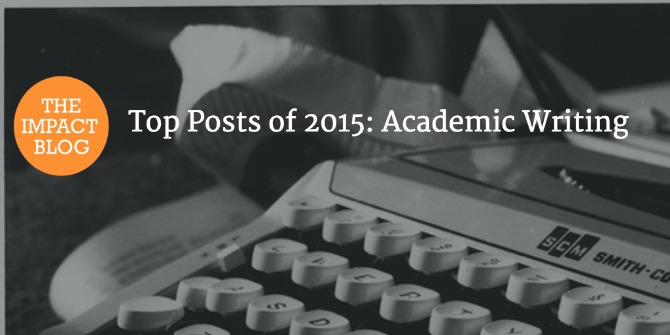
 The PhD by publication is an option increasingly available to doctoral candidates. This model can be a great way to build an academic profile but has unique challenges of its own too. Shannon Mason and Margaret K. Merga anticipate and offer answers to some of the questions candidates considering this model might ask; including advice on co-authorship with a supervisor, time management, coping with rejection, and capturing the evolution of your understanding of your research.
The PhD by publication is an option increasingly available to doctoral candidates. This model can be a great way to build an academic profile but has unique challenges of its own too. Shannon Mason and Margaret K. Merga anticipate and offer answers to some of the questions candidates considering this model might ask; including advice on co-authorship with a supervisor, time management, coping with rejection, and capturing the evolution of your understanding of your research.
Peer-reviewed publications are the bread and butter of the academic world. The quantity and quality of papers a researcher publishes can influence job applications, grant applications, performance reviews, and promotions. Unfortunately, the craft of writing academic papers and facilitating their publication is not typically a focus of doctoral education.
To help better prepare candidates for the realities of academia, universities increasingly allow the option to complete a PhD by publication, a model which encourages candidates to publish during their candidature, and to include their publications as, or within, their final submission. Jørgen Carling has previously outlined the benefits of completing the PhD by publication. While we agree there are many advantages to adopting this model, there are also challenges that need to be considered to ensure success.
We understand many of these challenges, having both completed a PhD by publication in the past five years. In our field (education) and location (Australia), the traditional thesis dominates, and while that is slowly changing, we encountered a range of problems for which there was little advice or support available at the time. Here we anticipate some of the many questions candidates may ask, and offer possible answers based on our experiences and research.
How many papers should I publish?
There is no one correct answer! Regardless of the thesis mode, the goal of doctoral study is to make an original and significant contribution to a field. How many papers it will take to meet this goal will depend on many factors. We found that the average number of papers included in Australian theses was 4.5, but this ranged anywhere from one to 12 papers. Publishing in itself is not a guarantee of conferral of your degree, and quality may be more important than quantity.
Should I co-author with my supervisor?
Doctoral candidates often publish with their supervisors. Supervisors have always assisted their students in the development of their traditional thesis, to differing degrees, but in the past this has gone relatively unacknowledged. Most university guidelines will require candidates to declare each author’s contribution to a paper, and thus a higher level of authorial transparency is achieved. Co-authoring papers gives doctoral students an apprenticeship in writing journal articles, as well as experience in collaborative writing and working in research teams – a regular part of an academic’s job.
Early and frank communication is important. The three co-authored papers in Shannon’s thesis were written in the beginning stages of her candidature when more hands-on support in the process of writing and publishing was needed. She was then well-equipped to write the remaining four papers alone. Margaret’s thesis was unusual as all included papers were sole authored, which was only possible as she had already co-authored two peer-reviewed papers prior to candidature.
We strongly recommend establishing clear mutual expectations between candidate and supervisor as early as possible.
How can I publish everything in time?
The process of preparing a manuscript, submitting to a journal, waiting for reviews, attending to requests for revisions, copy editing, and final publication can be extensive in some fields. This can be very frustrating for candidates who are working to a doctoral submission deadline. It is important to check journal guidelines for their average turnaround times. Once a paper is under review, don’t be afraid to follow up politely once this time has passed.
It is also important to check your PhD-by-publication guidelines, because many universities allow the submission of papers at various stages of production, such as those still under review. This allowance is particularly helpful to ensure the inclusion of papers developed in the later stages of your candidature.
What if my paper gets rejected?
For doctoral candidates just developing their new identities as researchers, rejection can be difficult to take. The reality is that even experienced academics deal with rejection at some time, perhaps more often than they might like to admit! The important thing to remember is that rejection is a normal part of the process. The decision is not always about the quality of the paper, but its fit within that particular journal at that particular time. It is important to become familiar with any journal that you intend to submit to, including the theories and methods that are favoured, and the type of academic voice appropriate for that journal.
What if my papers don’t flow as a thesis?
There are particular difficulties in developing a single submission based on multiple publications, each with their own focus, style, and format, and, as we recently explored, there are a number of favoured options for structure. Nikander and Piattoeva offer useful advice on how to use the integrating chapter to connect papers together.
There are also other issues that might arise from the transformational nature of doctoral study, where students learn while doing. For example, Margaret began to question her use of one of the informing concepts she had used in her early papers. In her subsequent work, she challenged her own simplistic use of this concept. Rather than become discouraged by the discovery of earlier flaws in our work, we understand that as researchers, we will continue to grow and cast a critical gaze over our past knowledge base. We both used the integrative chapter of our theses to highlight these limitations, but also to make explicit the evolution in our understanding; as such, it was a very enjoyable chapter to write!
Conclusion
We found that completing our thesis by publication offered rewards and challenges that were in many cases unique to this thesis mode. That we both emerged as advocates for this thesis type would suggest it is well worth undertaking for those candidates who want their findings to translate quickly and disseminate widely.
To see the authors’ research in this area, please go to their project page on ResearchGate: “Publishing during PhD candidature”.
Featured image credit: John-Mark Smith, via Unsplash (licensed under a CC0 1.0 license).
Note: This article gives the views of the authors, and not the position of the LSE Impact Blog, nor of the London School of Economics. Please review our comments policy if you have any concerns on posting a comment below.
About the authors
Shannon Mason is Assistant Professor in the Department of Education at Nagasaki University, Japan. Her research interests include teacher attrition and retention, and language education pedagogy and policy. Her experiences completing a PhD by publication in 2017 led to her recent interest in emerging approaches to doctoral education.
Margaret K. Merga currently works as a Senior Lecturer at Curtin University in Western Australia. Margaret primarily conducts literacy research that spans the early years to adulthood. She also explores issues on educational psychology, adult education, higher education and health workforce education. She is currently working on projects related to the role of teacher librarians in fostering literacy in primary and secondary schools.








Readers may also be interested in our most recent paper, “Early career experiences of navigating journal article
publication: Lessons learned using an autoethnographic approach”.
It is available here: https://onlinelibrary.wiley.com/doi/epdf/10.1002/leap.1192
IN VIEW OF COMPETENCY-BASED EDUCATION, IS ARTICLE COHERENCE THAT NECESSARY FOR PhD BY PUBLICATION?
I agree on practically all you had to say and I appreciate that you have not made emphasis on the need to develop a coherent narrative between the journal papers.
In my previous unanswered reply posts on three PhD blogs I wrote that with low coherence it might not be possible to develop an overarching hypothesis or a general research question covering a number of diverse studies. This however, does not mean that if you are presenting a list of widely varied articles (yet, with a common denominator eg. public health) you cannot show your assessors that you are capable of answering any research question through acceptance or rejection of the null hypothesis. On the contrary, you would probably have covered several hypotheses testing that you would not even know from where to start! After all, it still reflects great competency to be able to publish several loose papers.
I see no academic feat in having a strong element of connectedness between the papers especially if this comes to the detriment of:
(a) the quality or rate of journal submission acceptance in terms of originality. Candidates who successfully manage to achieve a PhD by publications in science normally present no more than three or four papers revolving on the same theme or repetitive methodology with one paper building on the other (there’s a limit on how much you can keep adding onto the previous study to produce a coherent narrative.
(b) the level of the student’s (author’s) widespread generation of new knowledge since the papers would be closely related to each other (strong coherent body).
and (c) the number of papers which can be kept being added (and repeated) onto previous studies.
I feel that the requirement for coherence is not the right way of defending the standards of a PhD by published works, whether retrospective (ie. by prior publications) or prospective (when you start publishing your studies with the university you have registered your application). One has to understand that the point of departure with a PhD by publications (sometimes called, article-based PhD) is totally different from when you decide to undertake a conventional or traditional PhD by monograph with only ideas or proposal in your hands.
So, whereas when you go for a monograph of a single specialised subject it is justified to have a coherent narrative, for a thesis by publication (involving a synthesis, commentary or integrative chapter), which is basically a form of compilation written independently by the student, it is a different story. To start with, you only need to prepare a 10-15,000 commentary constituting a summary of the appended papers, whereas with a one-topic monograph you can go up to 100,000 words and sometimes even more.
Needless to say, the PhD by publication student should clarify the actual contribution to knowledge, especially if the papers are written by several authors. What’s important is that the commentary should not provide new results, but should critique the papers and preferably offer new conclusions since the extent of the journal articles normally does not allow this kind of longer discussion.
In brief, I feel that coherence should not remain central and more weight should be directed on single-authorship, number of papers published, originality and widespread contribution to knowledge. In my opinion, these should be the distinct features of this relatively new type of PhD.
One may wish to contact me personally on miccha@onvol.net
Charles Micallef
Author of: ‘Critical analysis: a vital element in healthcare research’.
Excellent Write up.
I have throughly gone through the article and according to my personal
observations, I think it is amazing.Being associated with writing profession, I
must mention that https://academicwritingpro.com/research-paper-writing-services/ are quite helpful
nowadays. Furthermore, quality is also an important aspect.
Great write up! Here is one more tip regarding ‘How can I publish everything in time?’ If a PhD student has an R&R with minor revisions, it’s worth noting that in the thesis, especially if it is for a prestigious journal. So even if the student can’t publish in time, they can get credit for almost publishing in time.
Dear Mollie,
Thank you for your comment. Great point, totally agree.
I think it is good to remember that even though the TBP might be ‘packaged’ as a product, it really is more about the process of learning to be a researcher, and that really is never ending. Communicating the different phases at which a researcher is engaging is a great idea. Indeed, I included details of publication rejections that I experienced, and my different reactions to them (by way of emails to my supervisor) at different stages of the journey, an inclusion that my assessors commently highly on.
A PhD by publication is nonsense if the faculty prescribe the journals where your work must be published. who said every journal would like to publish every research? for the university with restricted academic freedom, they mistake some ridiculous rules for having higher bar of pursuing doctoral degrees when the Times Higher Education (THE) ranks far away from their pre-conceived opinions. I submit that PhD by publication is good where freedom to publish in alternative high quality journals exist. absence of that its a total mess!
Dear Peter,
Absolutely agree, and this is something that has been raised in an upcoming study. We absolutely advocate for doctoral researcher agency in selecting the outlets for their publications that are best suited to their study, field, and career stage.
Create an online publication or write a newspaper good writing skills is very important.
Dear All;
Thank you very much for the quality article and feedback . It is very interesting topic. I think during Covid-19 the quarantine imposed on people including students, completing PhD using this approach can be very suitable. I have the following questions:
– Has the PhD candidate to register in a University? and if so, can you please share the names of the Universities that can accept such type of PhD studies?
Many thanks again and best regards
Omar
Dear Authors,
This is a great article. Is Phd by Publication equal merit to traditional route of Phd? What degree title a candidate will get in the route of Phd by Publication?
I think there is still discrimnation in academic field between one who hold phd by Publication and other Phd in Traditional route.
Regards,
Yadam